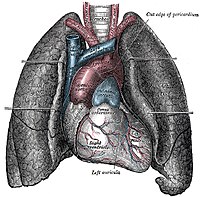
Scientists have used the novel idea of a "pollution vest" to determine that individual exposure to air pollution can harm a person's heart health beyond whatever damage that community-level exposure can cause. WEDNESDAY, Nov. 12 (HealthDay News) -- By Amanda Gardner / HealthDay Reporter
"The challenge of air pollution is that what people are exposed to and what most studies talk about . . . rarely represent the micro environment of what's in your house," explained American Heart Association spokesman Dr. Russell Luepker, Mayo professor of epidemiology and community health at the University of Minnesota, Minneapolis.
"People have been working to try to get individual monitors that people can wear, so they can know what people are really inhaling as opposed to what they might be inhaling a mile away from where the monitor was." Image via Wikipedia
Image via Wikipedia
"People shouldn't panic, but it's important that people be aware that air pollution is a contributor to cardiovascular disease," said Robert Bard, co-investigator of a study that was presented Wednesday at the heart association's annual scientific sessions, in New Orleans. "Things people can do include supporting legislation for cleaner air initiatives and, if somebody has cardiovascular disease, they may consider avoiding exposures to air pollution during peak levels, because this can potentially be a trigger for a cardiovascular event. Things everyone can do include limiting commutes and contributing less to production of pollutants."
Previous research has drawn an association between fine particulate matter air pollution and an increased risk for cardiovascular events.
It's unclear however, if daily changes in particulate matter might affect the heart and if ambient (outside) sources of air pollution have different effects than non-ambient (inside) sources.
The authors of this study were able to determine just that. Image by marielito via Flickr
Image by marielito via Flickr
Sixty-five participants in the cardiovascular sub-study of the Detroit Exposure and Aerosol Research Study (DEARS) wore vests outfitted with monitors to collect both personal and community-based levels of air pollutants on five consecutive days during both the summer and the winter. All volunteers were nonsmokers and lived in nonsmoking households in three different areas of Detroit.
"We specifically looked at the pollution they were individually exposed to," explained Bard, who is a research associate in the division of cardiovascular medicine at the University of Michigan Medical Center in Ann Arbor.The average person in the study experienced increased blood pressure (1.6 millimeter of mercury) and a narrowing of blood vessels related to personal air pollution within two days of exposure. These changes could lead to heart attacks, strokes and heart failure, the authors stated.
Broader, community exposure was linked with poorer blood vessel functioning, but not  Image via Wikipediahigher blood pressure. The air pollution measured was within parameters considered acceptable by the U.S. Environmental Protection Agency.
Image via Wikipediahigher blood pressure. The air pollution measured was within parameters considered acceptable by the U.S. Environmental Protection Agency.
And almost one-third of volunteers were exposed to secondhand smoke, even though they were nonsmokers living in nonsmoking households.
According to the study authors, a 10-microgram per cubic meter increase in air pollution at the community level leads to a 1% chance of dying the day after exposure, amounting to about one extra death per day in an area of 1 million to 5 million people.
SOURCES: Robert L. Bard, M.S., research associate, division of cardiovascular medicine, University of Michigan Medical Center, Ann Arbor; Russell V. Luepker, M.D., American Heart Association spokesman, Mayo professor, department of epidemiology and community health, University of Minnesota, Minneapolis; Nov. 12, 2008, presentation, American Heart Association annual scientific sessions, New Orleans
Copyright © 2008 ScoutNews, LLC. All rights reserved







No comments:
Post a Comment